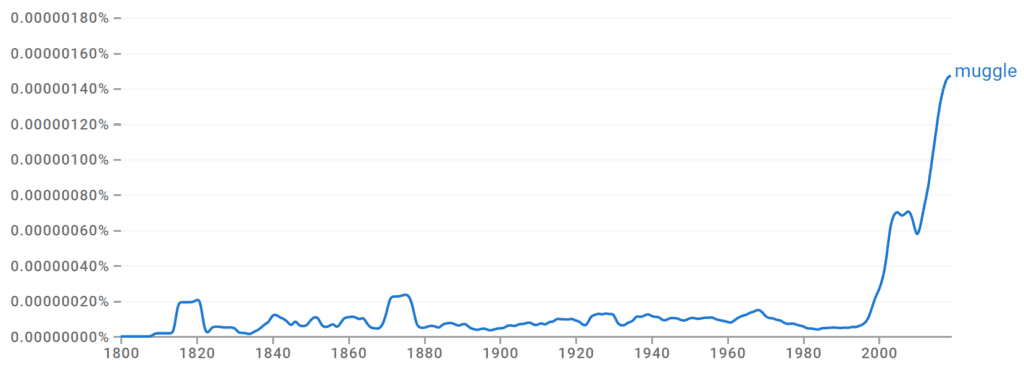When you hear the term muggle used, you most likely think of the author J.K. Rowling’s widely popular novel series involving the Wizarding World. The idea behind the stories, first written down on a napkin and other various writing surfaces as ideas popped into her head, has become a gigantic franchise with spin-off stories, movies, and even Wizarding World vacation locals!
Muggles are an essential part of the stories since the evil permeating her world would like nothing better than to be rid of them altogether. And today, over 25 years after the first book’s publication, the word has since become a mainstream title amongst her millions of fans.
But did you know the word did not originate with Rowling and actually has roots in the 11th and 12th centuries?
Let’s take a closer look at this interesting history and the popularity of its use today.
What Is a Muggle?

In the modern sense, the term muggle was coined by J.K. Rowling in her Harry Potter series of books. In the Harry Potter world, a muggle is someone who does not have magical powers.
In the Wizarding World, that would be a terrible deficit, and factions exist within their ranks concerning those who are “pure-blood” and from a long line of magical inheritance and those whose lineage is “muddied” by Muggle (or non-magical) blood.
The term has made its way into everyday language to mean that a muggle is one who doesn’t have a particular skill. For example, people who are members of a particular community may refer to outsiders as muggles. Runners may call non-runners muggles, or academics may call blue-collar workers muggles.
The word has become prevalent enough that the Oxford English Dictionary added the word muggle to its ranks in 2003 as “a person who is not conversant with a particular activity or skill.”
For example:
- Emmett is a muggle, has a non-academic job in the industry, and as such, has few options for vacation time.
- Your muggle-esque observation is somewhat short-sighted, given your lack of experience with the topic.
- Wine connoisseurs will easily differentiate the various flavors and aromas of the newest vintage, but to a wine-tasting muggle, it will likely taste like any other red wine.
Muggle Etymology

Despite its new lease on life, the word muggle goes back at least eight centuries and has had various meanings through the years.
The modern use of the word first appeared in the 1997 American release of Harry Potter and the Sorcerer’s Stone when an old wizard exclaims, “Rejoice, for You-Know-Who has gone at last! Even Muggles like yourself should be celebrating this happy, happy day!”
The context of the word is quickly realized to mean anyone, not of the wizarding world, but we can trace the word’s use back to the Middle-English poet Layamon, who told the tale of the mythical founding of Britain in the 13th century. In the poem, he writes of a muggle to describe the resemblance of a tail of a fish, likely adapted from the Latin word mugil, which was a species of fish:
- “ Þa tailes heom comen on..Iscend wes þat mon-cun. muggles.”
In the 17th century, playwright Thomas Middleton used the word muggle in his 1608 play Your Five Gallants to mean “sweetheart” or to donate a young woman with affection:
- “Oh the parting of vs twaine, Hath causde me mickle paine, and I shall nere be married, Vntill I see my muggle againe.”
It is believed muggle, in this sense, was derived from an old French word, mulier, meaning wife.
Muggle again took on a new definition in the 1920s when the Wise-Crack Dictionary (a book of slang) lists it to mean “joint” or “marijuana” when used as muggles, plural.
Let’s Review
Despite its use through almost 100 years of language, muggle is now used as a title to indicate a group of people who lack a particular skill or membership in a specific community.
Made famous by J.K. Rowling in her popular Harry Potter novels, Muggles were defined as non-magical humans – quite unlike and lacking in skills compared to those existing within the Wizarding World.
The word has since expanded to encompass anyone who doesn’t fit in or have knowledge of certain skills.
